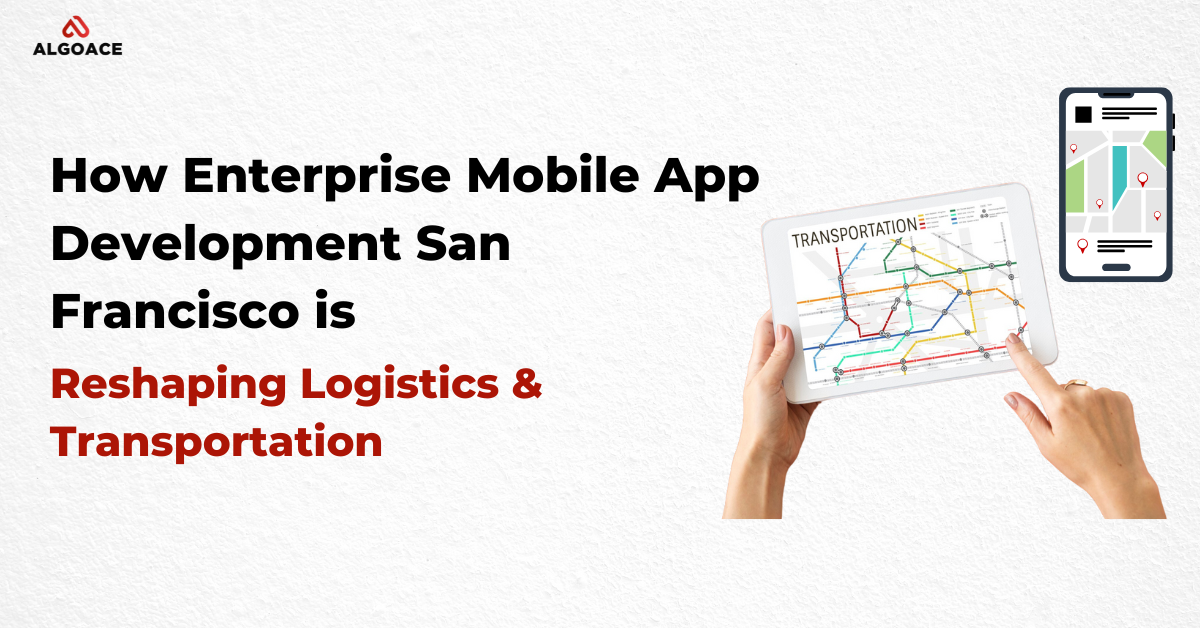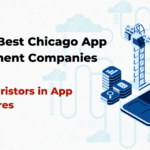
In the dynamic realm of logistics and transportation, maintaining efficiency and access to real-time data is essential for gaining a competitive edge. The swift progress in enterprise mobile app development San Francisco has enabled companies to utilize advanced technologies to optimize operations, enhance fleet management, and improve last-mile delivery services.
As a leading global technology center, San Francisco has emerged as a focal point for innovative mobile solutions that are reshaping supply chain management and logistics. Software development companies in this area are consistently pushing the boundaries of innovation by incorporating AI, IoT, and blockchain technologies into enterprise mobile applications, thereby ensuring that businesses remain competitive in an increasingly digital economy.
This article will examine how enterprise mobile app development San Francisco is transforming the logistics and transportation sector, the technologies that are being utilized, and the imperative for businesses to embrace these solutions to succeed in a fiercely competitive landscape.
The Role of Enterprise Mobile Apps in Logistics & Transportation
With the rise of digital transformation, logistics companies are heavily investing in mobile apps to optimize operations. Here’s how:
1. Real-Time Fleet Management
The advancement of enterprise mobile applications has significantly enhanced fleet tracking and management, allowing logistics firms to:
- Track vehicle movements through GPS technology.
- Enhance route efficiency utilizing AI-driven predictive analytics.
- Minimize fuel usage by pinpointing the most effective routes.
- Guarantee adherence to traffic laws and safety regulations.
For instance, major logistics companies such as UPS and FedEx leverage AI-enabled mobile applications to refine delivery schedules and monitor fleet operations, leading to substantial reductions in operational expenses.
2. Last-Mile Delivery Optimization
The final segment of the logistics process is frequently the most costly and time-intensive. In San Francisco, enterprise mobile app development has led to the creation of AI-powered logistics applications that:
Similarly, Android Development Houston is playing a crucial role in optimizing last-mile delivery solutions, enhancing efficiency, and reducing operational costs for logistics companies.
- Forecast delivery timeframes by utilizing real-time traffic and weather information.
- Offer immediate notifications to customers with precise estimated time of arrival (ETAs).
- Allow drivers to scan barcodes and promptly update the status of deliveries.
- Minimize unsuccessful deliveries through intelligent re-routing.
3. Warehouse and Inventory Management
The incorporation of IoT and mobile applications has significantly streamlined warehouse operations:
- Intelligent inventory management through RFID technology and barcode scanning.
- Artificial intelligence-driven demand forecasting for efficient stock replenishment.
- Automated picking and packing processes to boost operational efficiency.
- Cloud-based warehouse management systems provide real-time updates.
Organizations such as Amazon leverage AI-driven logistics applications to automate warehouse functions, thereby decreasing processing times and enhancing inventory precision.
4. Predictive Maintenance for Vehicles
Vehicle breakdowns can result in considerable financial losses due to downtime. Enterprise mobile applications that utilize IoT sensors and machine learning offer the following advantages:
- Automated diagnostics to forecast maintenance requirements.
- Notifications for component replacements before failure.
- Remote surveillance of engine performance and fuel efficiency.
- AI-driven insights to avert breakdowns.
For instance, Tesla’s fleet management system employs AI-based predictive maintenance to notify drivers of potential issues before they arise, thereby minimizing operational downtime.
Cutting-Edge Technologies Driving Enterprise Mobile Apps in Logistics
Emerging technologies such as artificial intelligence, the Internet of Things, blockchain, and cloud computing are transforming enterprise mobile app development San Francisco. These advancements facilitate more intelligent, rapid, and efficient logistics operations. They improve real-time tracking, enable predictive analytics, and ensure secure transactions, thereby revolutionizing the management of supply chains for businesses.
1. AI and Machine Learning
Artificial Intelligence (AI) is significantly influencing the development of enterprise mobile app San Francisco, especially in the following areas:
- Optimization of routes for delivery personnel.
- Intelligent inventory forecasting to prevent stock shortages.
- Automated chatbot support for immediate customer assistance.
- Models for demand prediction to enhance logistics planning.
2. Internet of Things (IoT)
IoT-enabled devices play a vital role in logistics applications by offering:
- Real-time GPS tracking for shipments.
- Monitoring of temperature for perishable items.
- Diagnostics for fleets to ensure proactive vehicle maintenance.
Organizations such as DHL and Maersk utilize logistics applications powered by the Internet of Things (IoT) to improve visibility within the supply chain and facilitate cargo tracking.
3. Blockchain for Secure Transactions
Blockchain technology is significantly improving security and transparency within the logistics sector by:
- Guaranteeing secure and unalterable transaction records.
- Minimizing paperwork through the use of smart contracts.
- Mitigating fraud in supply chain operations.
- Monitoring shipments via a tamper-resistant ledger.
IBM and Walmart have incorporated blockchain into their logistics mobile applications to establish a transparent supply chain ecosystem.
4. Cloud Computing for Scalability
Cloud-based logistics applications enable enterprises to:
- Access and store data from any location.
- Easily scale their operations.
- Integrate seamlessly with external software such as ERP and CRM systems.
- Facilitate real-time updates and collaboration among supply chain stakeholders.
How Software Development Companies in San Francisco Are Leading the Way
San Francisco hosts several of the foremost software development companies that focus on enterprise mobile applications for the logistics sector. The following outlines the reasons why businesses are collaborating with these companies.
1. Access to Cutting-Edge Technologies
San Francisco’s technology landscape provides cutting-edge innovations in artificial intelligence, the Internet of Things, blockchain technology, and cloud computing, guaranteeing that logistics companies receive top-notch mobile solutions. Additionally, Texas App Prototype Development is gaining traction, offering businesses robust and scalable app prototypes to streamline logistics operations.
2. Expertise in Scalable Enterprise Solutions
Leading software development companies in San Francisco create enterprise mobile applications that are capable of scaling alongside business expansion, delivering bespoke solutions specifically designed to meet the requirements of the logistics and transportation sectors.
3. Focus on Cybersecurity and Compliance
As cyber threats continue to escalate, enterprise mobile app development San Francisco emphasizes the following key areas:
- Implementation of data encryption to safeguard sensitive business data.
- Adoption of multi-factor authentication (MFA) to ensure secure access to applications.
- Adherence to industry regulations such as GDPR and CCPA.
4. Seamless Integration with Legacy Systems
Numerous logistics companies continue to depend on outdated software systems. Software development companies in San Francisco provides the following assurances:
- Seamless integration with current ERP and CRM systems.
- APIs for external services such as payment processing and mapping applications.
- Strategies for cloud migration to enhance operational efficiency.
The Future of Enterprise Mobile App Development San Francisco in Logistics
The evolution of enterprise mobile app development San Francisco’s logistics sector is significantly influenced by artificial intelligence, the Internet of Things, and automation. These technologies facilitate more intelligent and efficient supply chain processes. Innovations such as autonomous delivery systems, predictive analytics, and enhanced 5G connectivity will provide logistics companies with unparalleled levels of speed, precision, and sustainability.
1. Autonomous Delivery Systems
The emergence of self-driving technology has prompted logistics companies to invest in autonomous delivery vehicles and drones, which are supported by enterprise mobile applications.
2. AI-Driven Decision Making
Applications powered by artificial intelligence are expected to facilitate real-time decision-making utilizing historical data, thereby enhancing fleet management and delivery operations.
3. Sustainability-Focused Solutions
The trend of green logistics is on the rise, as applications are being developed to optimize routes, leading to decreased fuel consumption and lower carbon emissions.
4. 5G-Powered Logistics Apps
The implementation of 5G networks will enable logistics applications to provide:
- Accelerated data processing for immediate tracking capabilities.
- Reduced latency in communication, enhancing coordination efforts.
- Improved connectivity for Internet of Things (IoT) devices.
Conclusion
The influence of enterprise mobile app development San Francisco on logistics and transportation is significant. With capabilities such as real-time fleet monitoring and AI-enhanced route optimization, mobile applications are revolutionizing supply chain processes and enhancing operational efficiency.
Prominent software development companies in San Francisco are at the forefront of innovation, utilizing technologies such as AI, IoT, blockchain, and cloud computing to develop scalable and secure logistics applications. As organizations embrace these technological advancements, the future of logistics is poised to be quicker, more intelligent, and increasingly efficient.





0 Comments